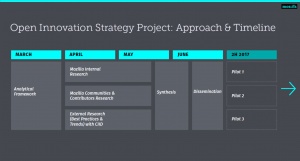Innovation/Projects/Open Innovation Strategy: Difference between revisions
(→How) |
|||
| Line 8: | Line 8: | ||
==Methodology== | ==Methodology== | ||
In order to begin from an evidence-based, shared understanding of the problem, the project researched three perspectives: | In order to begin from an evidence-based, shared understanding of the problem, the project researched three perspectives: | ||
'''Internal Research''' | '''Internal Research''' | ||
We documented internal perspectives on open source and external collaboration at Mozilla by interviewing numerous employees, particularly those working most directly with communities. | |||
'''Communities and Contributors Research''' | '''Communities and Contributors Research''' | ||
| Line 24: | Line 26: | ||
Although the project | Although the project was focused on MoCo, it was run in coordination with MoFo. | ||
==Deliverables== | ==Deliverables== | ||
Revision as of 19:11, 13 November 2017
MoCo Open Innovation Strategy Project
“Openness” defines Mozilla more than any other characteristic, in both the products and technologies we build and in how we operate.
In 2017, the Open Innovation team conducted a research project to help Mozilla (MoCo) revitalize participation and broader external engagement to be a source of competitive advantage for our products and technologies. The project analysed how effective Mozilla is in its open practices across both staff and contributor communities as well as how other industry actors use openness for competitive advantage. Based upon these findings, the project made recommendations for how MoCo can better invest in and execute on being “open.”
Methodology
In order to begin from an evidence-based, shared understanding of the problem, the project researched three perspectives:
Internal Research
We documented internal perspectives on open source and external collaboration at Mozilla by interviewing numerous employees, particularly those working most directly with communities.
Communities and Contributors Research
This component analyzed Mozilla communities to understand who they are, how and what they engage with, their motivations, and how they’re connected to one another as well as to other open source and open Web projects. This was done through a survey of over 1000 community members as well as an analysis of 16 years of contribution data (Bugzilla, GitHub, and more), which was driven by Bitergia. The research also built on and extended related historical work.
External Research
In partnership with the Copenhagen Institute of Design, (CIID), we conducted case studies of six organizations for inspiration and lessons. Target organizations were Sage Bionetworks, 23andme, Arduino, Aleph Objects, Automattic, NASA, and Kubernetes. They were chosen because they varied in market sector and met selective criteria such as being mission-focused, reliant upon external participation in ways fundamental to strategy and product, and supported by vital, growing communities.
Although the project was focused on MoCo, it was run in coordination with MoFo.
Deliverables
By the end of this project, we expect to have:
- Recommended open practices to deliver competitive advantage for Mozilla product and technology projects
- How to measure success, including metrics where possible and applicable
- How these practices are supported by Mozilla and community structures today and recommended changes
Expected Benefits
In general, this project aims to help us accomplish our mission by improving how we gain competitive advantage with open practices and helping us better match resources and needs -- in order for our actions to have more consistent, market-focused impact.
Benefits include improving Mozilla’s ability to:
- Where appropriate, provide a consistent way of measuring the value of “open” to MoCo as well as to external contributors/communities so we can better align resources and needs and confirm our actions have the right effect. Where formal measurements aren’t possible, provide a consistent way of defining and executing towards the desired market impact
- Make market informed decisions about how MoCo can best be “open”
- Identify new opportunities for competitive advantage in “open”
- Think about how our organizational architecture -- our structure, process, people, and incentives -- should align with what we need to be “best-in-class” open
- In general, build on our strengths and address our weaknesses
Who
The project’s Steering Committee provides oversight and includes:
- Katharina Borchert • Accountable
- Patrick Finch • Responsible
- John Jensen • Director, Organization Strategy
- David Herman • Director Strategy, Emerging Technology
- Nick Nguyen • VP, Firefox Product
- George Roter • Head of Core Contributors, Participation
The project’s Core Team members drive the project and include:
- Patrick Finch • Responsible
- Susy Struble • Strategic advisor & Internal research
- Pierros Papadeas • Open source expert
- Rina Tambo Jensen • Lead researcher
- Ruben Martin • Communities and contributors research
- Alex Klepel • Internal communications
- David B. Schwartz (Princeton) • Researcher
External Partners
Timeline
The project launched in March 2017. Broadly, the timeline is:
- End of March: Finalize analytical framework
- April - May: Internal interviews, community survey and research, & external research; also internal communications about any useful findings as the project progresses
- Late May: Synthesis of findings & more internal communication
- Late June: Presentation of project findings
- Starting in July: General recommendations as well as a subset of recommendations which we’ll prototype with internal partners in 2H 2017
How to Participate
If you want to learn more about the project or have thoughts, suggestions, relevant research, or would like to directly participate, please contact the project Core Team. We will also communicate when we’re hosting internal discussions and meetings.
Past Research
This project will be informed by related research, historical and current, such as the D&I study and Open Source Experiments. Please contact the project team if you have relevant research that you can share.
About the Open Innovation team
The Open Innovation team exists to help product and technology groups make effective use of open methods across all phases of the lifecycle.
Our tactic is to prove internally that open methods work.
Our role is to be a centre of competence for:
- Shaping strategy for delivering value through open methods
- Being practitioners of open methods
- Delivering excellence in engaging external stakeholders

